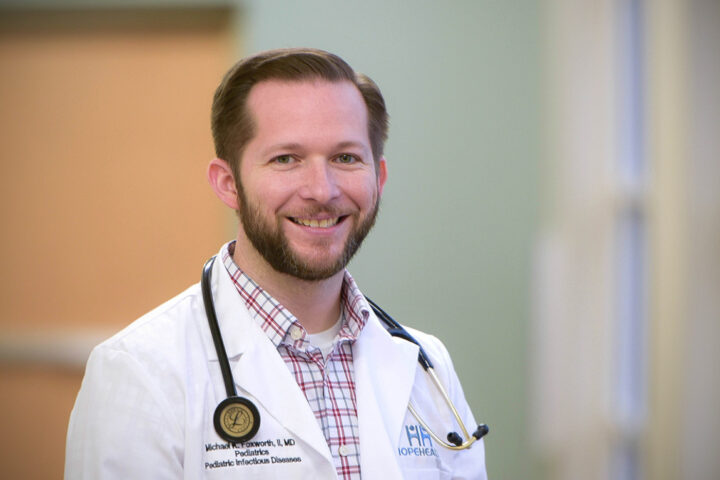Antibiotics Aren’t Always the Answer


“You should call your doctor so they can prescribe you some antibiotics.” “My child has been coughing for too long. I better get his pediatrician to prescribe him a Z-pack.”
As we head into cold and flu season, these (or something similar) are likely to be phrases that you hear, or maybe even say. However, in reality, antibiotics are probably not the answer. Antibiotic resistance is a growing problem in our world, largely due to their repeated and improper use. The Centers for Disease Control and Prevention (CDC) has recognized this as one of the biggest threats today. Antibiotic resistance means that the bacteria become difficult or impossible to treat with the current antibiotics available to us. When antibiotics no longer work, this results in more severe illnesses, more frequent doctor visits, longer hospitalizations, more expensive and toxic medications, and even death.
Some common diagnoses that you or your child may have been given antibiotics for in the past are: URI (upper respiratory tract infection), acute bronchitis, pharyngitis (not due to strep), sinusitis, or bronchiolitis. However, antibiotics should almost never be used for these illnesses. They are either caused by viruses, which cannot be treated with an antibiotic, or they resolve on their own regardless of antibiotic therapy. Over half of antibiotics prescribed in US clinics are inappropriate. These are typically prescribed for respiratory infections that are caused by viruses (again, which cannot be treated with antibiotics).
Why do physicians prescribe you antibiotics when they know it will not help you? It’s complicated. I wish they didn’t. It sometimes has to do with false perceptions of what your expectations are. Physicians sometimes think you will only be happy if you receive antibiotics. While that may be true on some occasions, recent studies tell us that most of the time patients and parents of patients just want to know that there is nothing seriously wrong with their child or themselves. Some doctors prescribe antibiotics unnecessarily for better patient satisfaction scores, particularly since this is beginning to affect how they might be paid. Sometimes it is just easier to mindlessly write a prescription for a Z-pack than it is to explain why you don’t need an antibiotic.
Whatever the reason, it is our duty to patients to be honest with them in our treatment plans. Giving antibiotics for an obviously viral illness is not being honest to our patient. Also, it isn’t without risks. Antibiotics are the cause of one out of five emergency department visits for adverse drug events and the most common cause of adverse drug events in children. Antimicrobial stewardship is the judicious use of antibiotics to treat infections only when necessary, with the right drug, for the right length of time. It is the job of all health practitioners that prescribe antibiotics, regardless of practice settings, to be good antimicrobial stewards.
What can you do as a patient? Every time you are prescribed an antibiotic, you should ask the physician, “Do I really need an antibiotic?” If your physician tells you that you don’t need an antibiotic, ask them why (if they haven’t already told you), and then follow their advice. If your symptoms change, or they worsen, call your physician’s office to see if you should be seen again.
I’ve mentioned Z-pack, or Azithromycin, a few times. This is mainly because it is my least favorite, but unfortunately overprescribed antibiotic. It is rarely the right choice for most of the infections it is prescribed for, but is the most inappropriately prescribed one.
Someone reading this may wonder what can be done, if antibiotics aren’t the answer, for the upcoming seasonal respiratory illnesses. Drink plenty of fluids. Get plenty of rest. Take Tylenol or Motrin (if you are over 6 months old) at appropriate dosages if you have a fever or pain (but only if it is bothering you, since fever is not dangerous). Fever is a symptom and demonstrates that your immune system is doing what it is supposed to be doing. I repeat…fever is not dangerous! Be patient. Cough may persist after respiratory illnesses for two or more weeks, even after the other symptoms have subsided. Cough is your body’s way of clearing secretions and is beneficial. For prevention, wash your hands frequently. Avoid touching your eyes, nose, and mouth. Live a healthy life that includes a balanced diet and exercise. Make sure that you and your children have received all recommended immunizations. Immunizations are one of the greatest health advances the world has ever seen. They are safe, effective, and one of the best ways to prevent many diseases. Most of all, understand that all of us play a role in preventing bacteria from becoming so resistant that they will no longer be effective. Our health, and future generations’ health depend upon it.